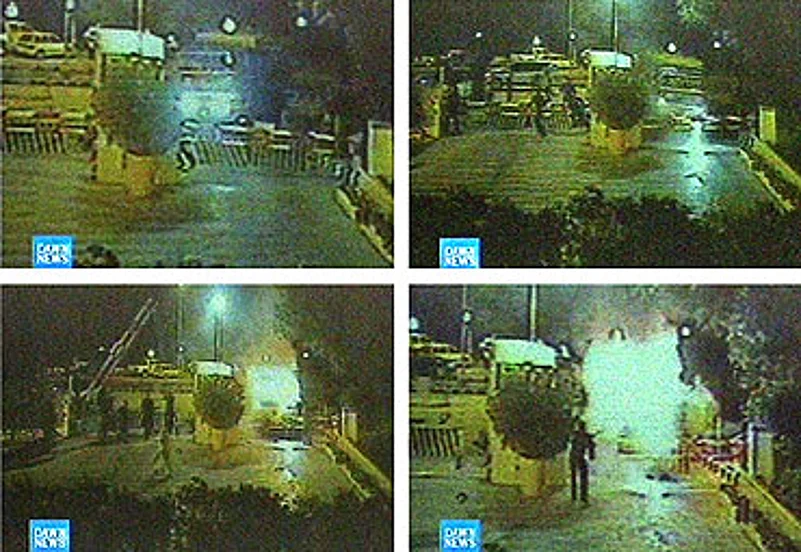- A dumper truck heads towards the Marriot Hotel's main gate
- The driver reportedly seeks entry. Smoke seen spewing out of his cabin.
- Security personnel scramble around in confusion. One even uses the fire extinguisher to douse the flames.
- A flash. The truck and guards vanish. Only a 30-feet crater is visible afterward.
***

Inside the Marriot, the guests had finished their iftaari and were awaiting their dinner. As the hotel caught fire, with gas pipes fanning the flames and portions of ceiling collapsing, panicky guests struggled to rush out of a hell their imagination might never have conceived. Senior journalist Imtiaz Alam was among those who escaped: he squeezed out of a half-open door of a lift only to hear it crashing down. He managed to locate the stairway of the fifth floor and rushed down. On the way out, he saw live electric wires in pools of water where pipes had burst. Alam recalls with a shudder: "People screamed and died as they got electrocuted."
As the fire spread and the temperature rose unbearably, people collapsed or were sucked in the inferno, some charred beyond recognition. Over the days the death toll rose, crossing 60 at the time of writing. Beyond this bald fact, analysts tried to unravel the symbolism inherent in the targeting of the Marriot, a haunt of foreigners. This school of thought says the suicide bomber chose the Marriot to display his rage against America killing Pakistanis in tribal areas.
Others, however, claim the suicide bomber's target was the Prime Minister's House, located on Constitutional Avenue that falls in the Red Zone, an area where the security is considered impregnable. Present there for iftaari was the entire Pakistani leadership, including the president, the prime minister and the army chief. Hosted by the speaker of the National Assembly, the iftaari was a celebration of a democratically elected president's address earlier in the day to a joint sitting of Parliament after nearly a decade. The suicide bomber's failure to breach the Red Zone, this school of thought claims, prompted him to target the Marriot, located off Constitutional Avenue and barely five km from the Prime Minister's House.
A little-known group, Fidayeen-e-Islam, telephoned the Dubai-based Al Arabiya TV office to claim the attack on the Marriot. But most analysts believe the group is a front for the real culprits. As Farookh Saleem, a political commentator, says, "As our national defence strategy appears to have collapsed, our own proxies, the Taliban and the jihadis, are now waging a war on Pakistan itself. They have killed 10,267 Pakistanis in five years. This is 6,000 more than the total number of Pakistanis killed in the 1965 Indo-Pak war. Our ex-proxies are trying to suck the soul out from the nation-state."
Most here believe the proxies Saleem speaks about still have links with the country's security establishment. It has not severed its contacts with the militants in the hope of retaining its clout in Kabul and Kashmir once the Americans depart from the region in the future. This is why Riffat Hussain, a professor at the Qaid-e-Azam University, asks, "Why else do you think the state does not come down hard on these criminals? If the Pakistani media has access to the likes of Baitullah Masud and Maulana Fazalullah, what really stops the state from reaching them?"
Hussain says the militants are on the rampage because the state is perpetually in reactive mode. It should instead destroy their "planning and executing structures" and evolve an indigenous security policy, he suggests. "We need to take out the American factor as well, whether or not it pleases the US. I do not see any friction between the US and Pakistan as both have shared interests. It's only when the Americans act alone and bombard our people that the friction arises," Hussain explains.
Indeed, America's repeated bombing of Pakistan's tribal areas has already fanned resentment. There now looms the danger of American soldiers crossing the Afghan border to hunt militants in Pakistan. This has prompted many to ask: Why's the country's sovereignty being violated repeatedly? Most here agree that Pakistan's covert support to the US has alienated the population, consequently providing a widening support base for the militants.
Agrees defence analyst Shirin Mazari: "We need to create space between ourselves and the US. Our covert assent to the US accessing our territory has to cease." But she says this strategy alone won't help and argues for a holistic approach. "This should include a genuine and immediate political and economic outreach to the people of tribal areas and other violence-affected areas." In other words, Islamabad should evolve a made-in-Pakistan policy to combat terrorism.
The American factor apart, there's no denying that the monster the establishment nurtured has turned to haunt ordinary Pakistanis, engendering a feeling of insecurity. In this Rasul Bakhsh Rais, a professor at the Lahore University of Management Sciences, finds hope. As he says, "I see the people now taking ownership of this war as the politicians have once again failed them. We saw this in the civil movement to restore the judiciary. In the end, the politicians had no choice left but to jump on to the bandwagon."
Rais, who helped organise a candlelight vigil for those killed in the Marriot blast, says the middle class must come forward again to take the ownership of Pakistan and prevent its collapse. "These confident, young voices, including those in the media, want to influence the socio-economic direction of the state. Right now, though, there is a big disconnect between the people and the politicians as far as this war is concerned."

















